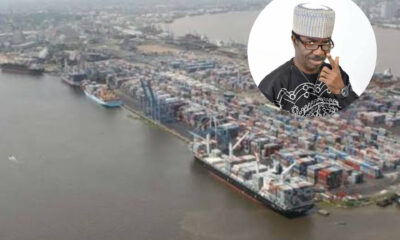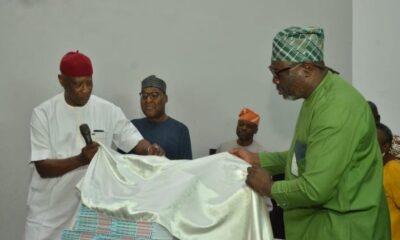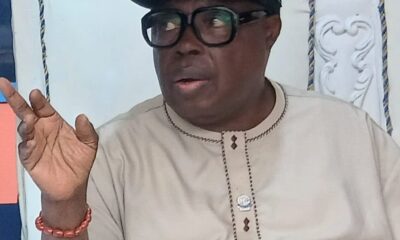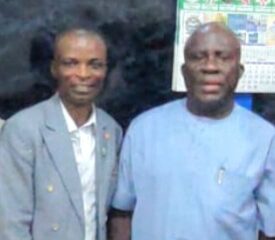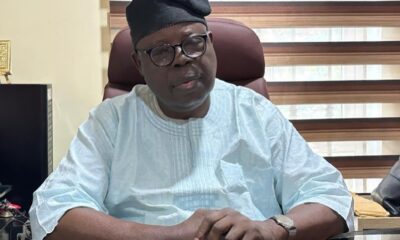Maritime
‘Blue Economy Depends On Collective Commitment’
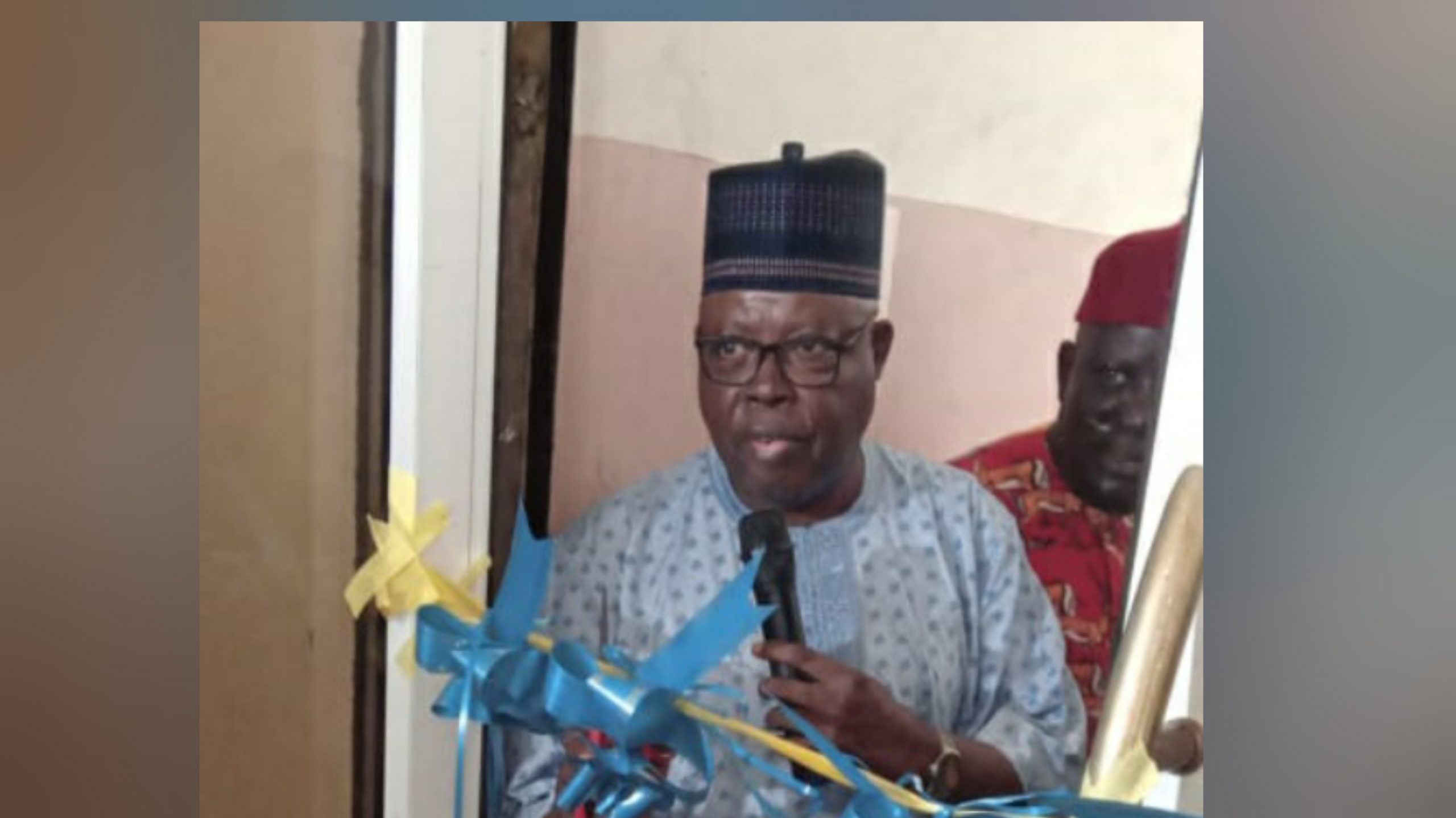
BY EGUONO ODJEGBA
Leading agencies of the federal ministry of marine and blue economy Thursday said for the blue economy to translate to ant real economic benefits, all stakeholders including government and the organized private sector must approach the industry with sincere and practicable commitment.

Jibril Buba, 3rd from left and other guests during the event
This is even as the Patron of LOME and father of Nigeria’s modern customs brokerage, Prince Olayiwola Shittu who cut the commissioning tape and declared the secretariat open urged the League to use the Secretariat as a centre of intellectual discourse and advocacy that is strong enough to become a reference point for critical industry agenda setting.
Speaking during the official commissioning of the Secretariat of the League of Maritime Editors (LOME) located at the sprawling Amuwo Odofin Industrial Estate Lagos, which was tied to the League’s Roundtable Parley with the theme ‘Unfolding the Benefits of the Blue Economy’ noted that without the identification of the critical and advantageous potentials, pooling of the required resources and collective purposeful drive, the nation’s blue economy may remain just a mere paper economic idea.
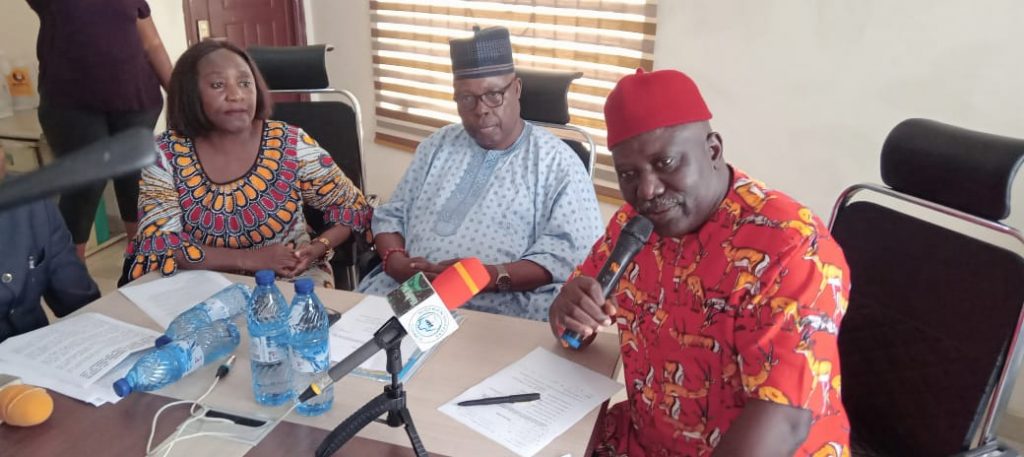
From right, Chief Agu, Prince Shittu and GM Corporate & Strategic Comminucations, NPA at the event
While calling for more practicable approach to exploit the new gold mine, chief executive officers (CEOs) of the various agencies enunciated fresh measures to be adopted to ensure that the nation’s blue economy contributes meaningfully to national development and growth.
Opening the discussion, the Nigerian Maritime Administration and Safety Agency (NIMASA), Dr BashirJamoh OFR said that the blue economy is already operational, but required the proper identification of comparative advantages, for the purpose of what is potentially advantageous and sustainable.
He challenged industry players and operators, to see themselves as co-drivers in the journey towards the success of the project, saying without this, the success story of the blue economy cannot be complete.
Jamoh, disclosed that whereas the blue economy in Nigeria is still unfolding, it is at the stage where collaboration of efforts, must concentrate at optimizing the comparative advantages in order to remain competitive in the global space.
Represented by the Director External Relations, Isichie Osamgbi, the DG NIMASA said the country must tell herself the truth that the blue economy holds the front row potential in resource growth and as a reservoir of leading revenue and hence should be accorded the right attention to thrive.
“Today we are no longer talking about benefits of the blue economy, we have passed that conception stage, current discussions should be how to tap into the various strata, the unfolding of the separate gold mines as already enshrined in the NIMASA Act.
“We need to do more collectively to improve on our individual spheres of contribution and achieve a sustainable template that will create beneficial impact. For us, the effort to strengthen maritime security and achieve maritime safety, grow shipping development, marine tourism and cruise transportation are key considerations we keep expanding.
“So, time has come to maximize our abundance in the blue economy and to also be able to operationalize their economic benefits by looking at the comparative advantages each sub natural resource provides. We must be determined and focused, we are not the first to have maritime security challenges, Singapore’s niche market is blue economy, we must have the political and operational will to tackle insecurity as top of the identified monster.’’
He continues: “We must come together and set the agenda for a functional blue economy and it is commendable that the League of Maritime Editors has been doing this, because however we look at it, today, the blue economy and the maritime domain holds the biggest prospect for achieving the required GDP.
“We must remove the sentiments of what is in it for me and embrace the patriotic ethos of what is in it for the country? When we agree on what should be done and how to go about doing them, and how to sustain the developments, and how to expand, then we would have actually become serious.
“And like all others the protection of the marine environment from pollution is also very key, and that takes us to our exclusive economic zones. What is economically critical is the exclusive zone, these are the issues that should agitate our minds.”
Also speaking, the Managing Director of Nigerian Ports Authority (NPA), Mr. Mohammed Bello-Koko represented by the Tin Can Island Port Manager, Jibril Buba, advocated enhanced capacities through deliberate policy in addition to stakeholders’ actions necessary to drive the processes.
While applauding LOME for providing the arena to brainstorm on the dynamics of the blue economy, Bello-Koko said the Authority has for a long time already prepared the grounds for its takeoff and consistent with its full realization has provided the right environment through which the required efficiencies, competences and capacities can be developed and sustained.
He said, “We know where we are coming from, we remember the era of warfare in the port, we used to have women delivering babies in the port and all that. And NPA in its quest for excellence in 1993, said ‘look, we cannot continue to remain like this…it was consciously or unconsciously the way of re-awakening the blue economy, it’s only that it didn’t get the name blue economy.
“Like the first speaker said, attitude is important, often roles and duties are dumped on NPA which does not belong to us. The foundation must be regenerated; must we now change the name of Nigerian Post Authority to Nigerian Port Plc all in a quest to improve efficiency.
‘’Of course, you all know our mandate efficiency in cargo handling is what will make the industry move forward. But whatever we come up with in as far as we do not change our behaviour, we do not change the way we do things, our overlapping functions…then the blue economy will not find its footing.’’

Digging into the past to provide the essential links, Bello- Koko captivated the audience with practical steps the authority has taken so far to making the blue economy environment attainable and operational with zero waiting time; whilst pointing out the real challenges.
“By 2006 we were partnering, we followed the pattern of the remaining people of the world and came up with what we now have as a landlord model. Now we now have the machinery. There is no berth that does not have mobile harbor cranes, some of them have up to eleven, some up to twelve, some more than that. They have the mobile harbor cranes; have enough gantry cranes in the terminals,
“Now, when we had the time that vessels used to come to this country and they spend up to 40 days, that is pre-concession of the terminals, it is 72 hours in case of container vessels and in case of bulk cargo at ENL and the rest, ten days. We’ve achieved 0% waiting time. Remember also the Amada shipping saga that is what gave an offshoot of Tin-Can Island port to act as a shock absorber to Apapa port.’
Bello-Koko also identified the fishing sub sector as an advantageous resource area that can grow the blue economy substantially.
He said, “If the government can deliberately, or the stakeholders can deliberately form a sort of consortium and then come up with a bigger fishing industry, I think it will move the industry forward because what we have now are fragmentations.
“Apart from probably the foreign partners that are doing well, exporting lobsters, our lobsters are well loved in America and UK. You can hardly find them here but those farmed constantly being exported to the US and to UK and we are making very good foreign exchange from it.
“Apart from the fisheries which can move the blue economy forward, we also have, like other countries, the net industry. The net industry in countries like India generates thousands of employment. Why do we have to import the nets and the crafts that were used in fishing?
“So if you can help us push for the development of the net industry, it will in fact assist in boosting the fishing industry. And then also we have the welders of the craft itself, that’s entirely another industry that will come up under fishing alone, so these are things that can generate serious employment opportunities, plus forex.”
The NPA boss commended LOME for the acquisition of its secretariat which has been designed to also serve as Centre for Media Advocacy, noting that the place will serve as catalyst for positive change in the industry.
“I am particularly delighted by the fact that this Secretariat will serve as a hub for collaboration, information exchange, and the development of best practices. It will be a platform where stakeholders from various segments of the maritime industry can come together to address challenges, explore opportunities, and shape the future of our sector”, he said.
In his contribution, the Executive Secretary, Nigerian Shippers’ Council (NSC) Hon Emmanuel Jime represented by the Council’s Director Consumer Affairs Department, Chief Cajetan Agu described blue economy as a huge economic potential that should be harnessed by all.
According to Jime the opportunities embedded in the blue economy is so enormous that it has become the project of the entire African Union (AU) even as he identified the potentials to include shipping, fisheries, underwater mining, cruise transportation, tourism, among others. He said that realizing these potentials, the AU, sees blue economy as a project which no country can go into alone because of the issue of security.
Jime stated that the criminals move around in different territorial waters, and as such the blue economy requires integrated collective regional implementation. He disclosed that the AU has developed a model on blue economy after studying the potential, adding that for the body, it is the rebirth of African renaissance.
Prince Shittu who also doubled as the chairman of the occasion charged the League to consider building its own Secretariat being the senior beat practitioners, and appealed to industry stakeholders to support the initiative whenever it comes on stream; noting the long stretch the league has been contributing to the progress of the maritime industry.
His words, “I am very delighted to be part of this epoch making event, some of you l have known over the years, two, three decades, I remember those days while serving under Alhaji Sanni kamba in the Association of Nigeria Licensed Customs Agents and l was the National Publicity Secretary, even though l was based in Port Harcourt, l was always coming around for meetings and briefings, so all along l have been part of you.
“I foresee a future where we will be moving out of this apartment and going to our own property. I am particular about your moderate critical reporting as senior practitioners most of the time, l think that it is good for the industry. But generally, people should also be able to criticize certain reports, especially misleading reports. One of the mistakes we make is that we read stories and forget to read the commentaries or push out reactions.
“I am delighted to see the representatives of the CEOs of the agencies at the commissioning of your Secretariat, this shows mutual respect, even though they get you to attend their commissioning events all the time, it is good they identify with you during your own one-off events.
“Knowing that your profession is one of utmost service with very little monetary attachment, l am sure that if you ask them for water to support your secretariat, they will give you wine”, he said light heartedly.
Earlier, in his speech, President of the League, Chief Timothy Okorocha told the guests that the Monthly Roundtable Parley of the Association, which was on hold is now back, assuring that the League would again be providing the missing nexus in the industry, with regards to developmental journalism, and the essential advocacy that nations depend upon to nurture their peculiar circumstances and to build capacities.
He expressed the League’s appreciation to all the stakeholders that have assisted the Association in one form or the other, noting that since the Secretariat that is being inaugurated, is the beginning of a new long journey, LOME will still need their support to make the Secretariat, a Center of Media Advocacy, as conceived by the body’s immediate past Executive.
They all, lauded the various contributions of the League and its members to the development of the maritime sector, and urged the League to continue to lead the way in developmental reporting by also occasionally engaging with younger reporters on the dynamics of constructive journalism.

